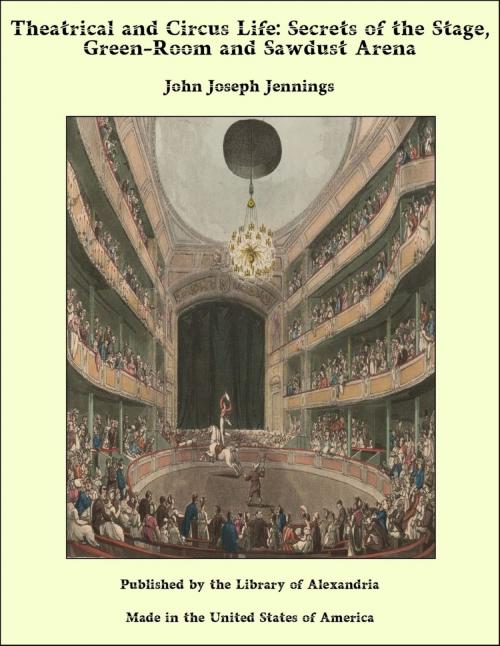Theatrical and Circus Life: Secrets of the Stage, Green-Room and Sawdust Arena
Nonfiction, Religion & Spirituality, New Age, History, Fiction & Literature| Author: | John Joseph Jennings | ISBN: | 9781465620026 |
| Publisher: | Library of Alexandria | Publication: | March 8, 2015 |
| Imprint: | Language: | English |
| Author: | John Joseph Jennings |
| ISBN: | 9781465620026 |
| Publisher: | Library of Alexandria |
| Publication: | March 8, 2015 |
| Imprint: | |
| Language: | English |
Anybody can get into the auditorium of a theatre by paying an admission fee reaching from twenty-five cents up to 1.50, and the sawdust precincts of the circus may be penetrated for the modest sum of fifty cents; but behind the curtain of the theatre and beyond the screened door through which circus attractions enter the exhibition arena, are sacred places, with secrets that are so valuable to their owners that they dare not for less than a small fortune allow the public to view or even to understand them. A general knowledge of the simplicity of theatrical and circus tricks—of the delusions that make up the stock in trade of showmen generally—would destroy their value as salable articles, and make everybody a little Barnum or Jack Haverly of his own, with ability to furnish himself with amusement at home, while the former mastodonic managers could only look on and weep at the educational facilities with which the country was overrun, and mourn the Shakespearian days when people were easily pleased with the poverty-ridden stage and bare representations that were offered them. But there is no fear that the public will ever be instructed up to such a high degree in regard to the inside workings of the theatre and circus, that there will not at all times be plenty of patrons for both these excellent forms of entertainment. The managers take good care to keep their secrets to themselves, as those who go prying around the shrines in which the theatric arcana are held, very soon find out. At the back door of every theatre—the entrance to the stage—is a cerberus of the most pronounced kind, who would sooner bite his own grandfather's ear off than allow anybody not entitled to the privilege, to pass him; while at the door of the circus dressing-room and all around it are faithful sentinels who will listen to no password, and through whose ranks it is as impossible to break as it is for the fat boy in the side show to throw a double somersault over seventeen horses, with an elephant as big as Jumbo at the far end of the line. It will, however, be the proud privilege of the readers of this book to get as close to the secrets of the stage and sawdust arena as one can well do without knowing absolutely all about them, and by the time the last page is read and the volume is ready to be closed, I think the readers will be both delighted and astonished with the revelations that have been made. Turn the average man loose on the stage of a theatre at night, while a play is going on, and it is a Russian kobol against a whole San Juan mining district that he will not know whether he has struck the seventh circle of heaven or is in a lunatic asylum. He will meet some very queer creatures in the scenes; he will see many strange things; the brilliant lights around him, the patches of color flashing into his eyes, the sea of faces and the tangle of millinery in the auditorium, will mystify him; the startling streaks of black upon the faces of the men and women who jostle him as he closely hugs the wings, their red noses and blooming cheeks, the general tomato-can aspect of their faces, the shaggy wigs and straggling beards that look as if they had been torn off the back of a goat only ten minutes before; the dismal, commonplace clothes that shine so radiantly when seen from a chair in the parquette or dress circle,—all these things will set his poor brain in a whirl; and while he is looking on awe-stricken, the scene shifters will come rushing down upon him with a new delusion, trampling on his toes in a manner that suggests in a most potential way his superfluity in that particular place, and pushing him aside without the merest apology, and perhaps with no other remark than a fragment of fervent profanity, as if he were a wretched street Arab in that mimic world in which the scene shifter and the captain of the "supers" play such very important parts. People come out of every imaginable place all around him. There seem to be doors everywhere,—in the walls, the floor, the ceiling, and even in space; and as the "vasty deep" and the rest of the surroundings give up their dwellers, the intruder receives fresh jolts and thrusts, and possibly additional donations of profanity. This, of course, applies only to the male apparitions that overwhelm the strange visitor to the new world behind the scenes. The female portion of that illusory sphere have nothing to say to him except with their eyes, which very forcibly inquire the meaning of his presence there.
Anybody can get into the auditorium of a theatre by paying an admission fee reaching from twenty-five cents up to 1.50, and the sawdust precincts of the circus may be penetrated for the modest sum of fifty cents; but behind the curtain of the theatre and beyond the screened door through which circus attractions enter the exhibition arena, are sacred places, with secrets that are so valuable to their owners that they dare not for less than a small fortune allow the public to view or even to understand them. A general knowledge of the simplicity of theatrical and circus tricks—of the delusions that make up the stock in trade of showmen generally—would destroy their value as salable articles, and make everybody a little Barnum or Jack Haverly of his own, with ability to furnish himself with amusement at home, while the former mastodonic managers could only look on and weep at the educational facilities with which the country was overrun, and mourn the Shakespearian days when people were easily pleased with the poverty-ridden stage and bare representations that were offered them. But there is no fear that the public will ever be instructed up to such a high degree in regard to the inside workings of the theatre and circus, that there will not at all times be plenty of patrons for both these excellent forms of entertainment. The managers take good care to keep their secrets to themselves, as those who go prying around the shrines in which the theatric arcana are held, very soon find out. At the back door of every theatre—the entrance to the stage—is a cerberus of the most pronounced kind, who would sooner bite his own grandfather's ear off than allow anybody not entitled to the privilege, to pass him; while at the door of the circus dressing-room and all around it are faithful sentinels who will listen to no password, and through whose ranks it is as impossible to break as it is for the fat boy in the side show to throw a double somersault over seventeen horses, with an elephant as big as Jumbo at the far end of the line. It will, however, be the proud privilege of the readers of this book to get as close to the secrets of the stage and sawdust arena as one can well do without knowing absolutely all about them, and by the time the last page is read and the volume is ready to be closed, I think the readers will be both delighted and astonished with the revelations that have been made. Turn the average man loose on the stage of a theatre at night, while a play is going on, and it is a Russian kobol against a whole San Juan mining district that he will not know whether he has struck the seventh circle of heaven or is in a lunatic asylum. He will meet some very queer creatures in the scenes; he will see many strange things; the brilliant lights around him, the patches of color flashing into his eyes, the sea of faces and the tangle of millinery in the auditorium, will mystify him; the startling streaks of black upon the faces of the men and women who jostle him as he closely hugs the wings, their red noses and blooming cheeks, the general tomato-can aspect of their faces, the shaggy wigs and straggling beards that look as if they had been torn off the back of a goat only ten minutes before; the dismal, commonplace clothes that shine so radiantly when seen from a chair in the parquette or dress circle,—all these things will set his poor brain in a whirl; and while he is looking on awe-stricken, the scene shifters will come rushing down upon him with a new delusion, trampling on his toes in a manner that suggests in a most potential way his superfluity in that particular place, and pushing him aside without the merest apology, and perhaps with no other remark than a fragment of fervent profanity, as if he were a wretched street Arab in that mimic world in which the scene shifter and the captain of the "supers" play such very important parts. People come out of every imaginable place all around him. There seem to be doors everywhere,—in the walls, the floor, the ceiling, and even in space; and as the "vasty deep" and the rest of the surroundings give up their dwellers, the intruder receives fresh jolts and thrusts, and possibly additional donations of profanity. This, of course, applies only to the male apparitions that overwhelm the strange visitor to the new world behind the scenes. The female portion of that illusory sphere have nothing to say to him except with their eyes, which very forcibly inquire the meaning of his presence there.















